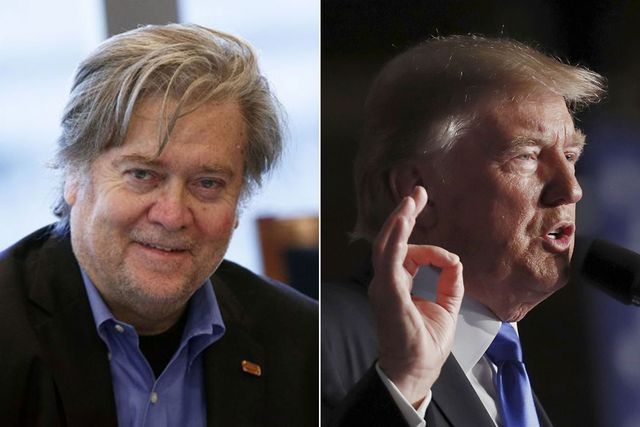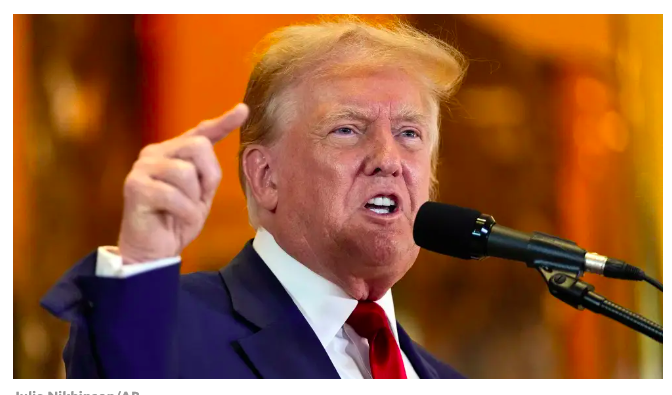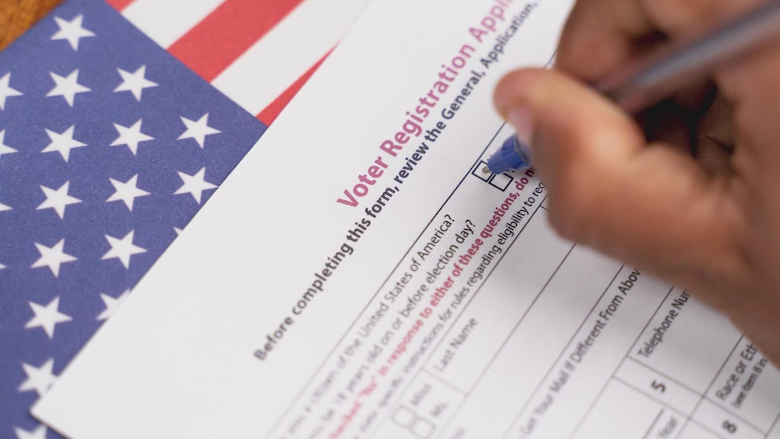Steve Bannon, former White House Chief Strategist and a close confidant of former President Donald Trump, has brought to light a comprehensive list of individuals and entities Trump aims to target in a potential second term.

This disclosure, made during a segment on Bannon’s “War Room” podcast, has sparked intense discussions within political circles and underscored Trump’s unwavering commitment to settling scores with those he perceives as adversaries.
Bannon’s revelation comes against a backdrop of Trump’s ongoing legal battles and the heightened calls for retribution within his base.
Following Trump’s partisan conviction on multiple charges, the former president’s rhetoric has intensified, emphasizing a desire for vindication and punishment of those he believes wronged him.

According to Bannon, the list is meticulously curated, targeting a mix of political figures, government officials, and media personalities who have been vocally critical of Trump or played roles in investigations and legal proceedings against him.
This “enemies list” includes prominent names such as former FBI Director James Comey, former Attorney General William Barr, and members of the January 6th Committee, among others.
Bannon articulated that the list reflects Trump’s strategic approach to a second term, one where retribution and consolidation of power would be paramount. He stated, “President Trump is not just seeking a return to office; he’s seeking justice for the witch hunts and smear campaigns that have tarnished his first term and personal reputation.”
This revelation aligns with sentiments expressed by Trump and his allies, who have consistently portrayed the legal challenges facing Trump as politically motivated attacks. They argue that the former president is a victim of a deep-seated establishment that resists his populist agenda and unconventional approach to governance.
During an interview with KNXV, a Phoenix ABC station, Trump repeatedly declined to rule out prosecuting Manhattan District Attorney Alvin Bragg, who brought the hush-money payment case to court. It’s not known how Trump would order that prosecution.
”Alvin Bragg did some very bad things,” Trump said when asked if he’d prosecute Bragg, repeating his claims that the district attorney is backed by Democrats and that the judge in the case was “highly conflicted.”
Again pressed if he would prosecute Bragg, Trump said “I’m not going to say anything one way or the other,” adding “we’re going to see what happens.”
When the interviewer noted he didn’t jail his political opponents during his first term and asked if that approach has changed now that he’s convicted, Trump responded that he thought it would be a “horrible thing” to arrest and jail the wife of a former president of the United States — referring to Hillary Clinton who was his rival in the 2016 general election. He went on to say, “The world is different now. They’re doing things that were never done.”
Trump’s supporters see his potential re-election as an opportunity to dismantle what they perceive as a biased and corrupt system.
Despite these warnings, Bannon remains undeterred, framing the list as a necessary step toward accountability and reform. He asserts, “This isn’t about revenge; it’s about holding people accountable for their actions and ensuring that the rule of law applies equally to everyone.”
The list includes not only political adversaries but also media organizations and journalists who have been particularly critical of Trump’s policies and actions.
This aspect of the list highlights Trump’s ongoing battle with what he terms the “fake news media,” a narrative that has resonated deeply with his base, who view the mainstream media as biased and hostile toward conservative viewpoints.
Legal experts and political analysts are closely watching the implications of Bannon’s disclosure.
Some suggest that this move might be a strategic play to galvanize Trump’s base and maintain momentum as he navigates his legal challenges and prepares for a potential 2024 run. Others speculate that the revelation of such a list could have legal ramifications, potentially being used as evidence of intent in ongoing investigations.
Bannon’s disclosure also raises questions about the broader impact on the Republican Party. While Trump continues to hold significant influence within the party, his focus on retribution may alienate moderate Republicans and independents, who could view such actions as detrimental to the party’s broader electoral prospects.
In a statement to ABC News, a spokesperson for Trump reiterated the former president’s commitment to his supporters and his vision for America’s future. “President Trump remains dedicated to fighting for the American people and ensuring that justice is served. The establishment has tried to silence him, but they will not succeed.”
As the political landscape continues to evolve, Bannon’s revelation serves as a stark reminder of the enduring tensions and divisions within American politics. Trump’s potential return to the presidency, guided by a detailed list of adversaries, underscores a new phase in the ongoing battle between the former president and his detractors.
In this charged atmosphere, the country watches closely, anticipating the next moves in a saga that promises to reshape the contours of American political life.

